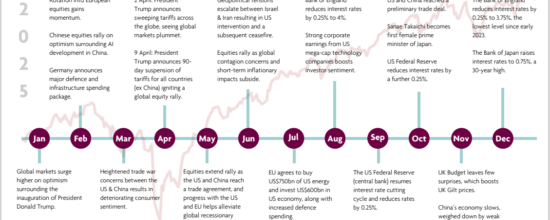Global stock markets wobble but soon recover
To download the market update click here: PDF | Word
Stock markets around the world rebound after fears of a US recession appear to be overstated
Despite global stock markets getting off to a bumpy start in August due to fears of a US recession, they soon recovered after encouraging data helped sooth worries of a downturn. At the start of the month, weak US jobs growth sparked concerns. The US labour market cooled significantly in July, with employers adding 114,000 jobs, which was far fewer than expected. Meanwhile, the unemployment rate rose to its highest level in nearly three years at 4.3%.
However, inflation slowed again in July, keeping the US Federal Reserve (Fed) on track to ease rates in September. The rate dipped below 3% for the first time since 2021, with price rises going up by 2.9% in July, down from 3% in June. Americans increased their spending, with retail sales jumping by 1% from June to July. The number of new unemployment benefit claims also fell by more than expected, easing concerns about labour market stability.
UK inflation increases
The Bank of England hit a setback after inflation rose for the first time this year. Prices rose by 2.2% in the year to July, up from 2% in June and slightly above the bank’s target. At the beginning of the month, the bank cut interest rates from 5.25% to 5% – the first cut since the start of the pandemic in March 2020.
The UK economy continued its recovery from the recession at the end of last year, growing by 0.6% in the three months to June. It follows a 0.7% increase in the first three months of this year. The jobs market remains resilient. Unemployment dropped from 4.4% to 4.2% in the three months to June from the previous quarter. Meanwhile, wage growth continued to slow, rising at an annual rate of 5.4%.
Europe’s economy turns a corner
The euro area economy appears to have turned a corner after flirting with recession during the second half of 2023. It grew slightly more than expected in the second quarter at 0.3%. Spain posted the strongest quarterly growth, with 0.8%, followed by France and Italy which expanded by 0.3% and 0.2 % respectively. However, it was another disappointing quarter for Germany, which contracted by 0.1%.
Inflation across the region ticked up to 2.6% in July, which is above the European Central Bank’s (ECB) 2% target. Core inflation, which excludes more volatile food and energy prices, hit 2.9% in July. The ECB held rates steady after reducing them in June, leaving open the option for another cut in September.
Meanwhile, Asian stocks rallied after fears of a US recession faded, helping to reverse the steep declines seen earlier in the month. China’s economy continues to be weighed down by a persistent property slump, low consumer spending and elevated unemployment.
This real estate downturn slowed overall fixed asset investment growth to 3.6% from January to July, compared with a 3.9% rise in the first half of the year. The unemployment rate increased to 5.2% as economic momentum slowed and business confidence weakened.
Despite surprising markets with a rate cut in July, China kept its benchmark lending rates unchanged. Imports grew by 7.2% in July, exceeding expectations, while export growth dipped to 7%.



